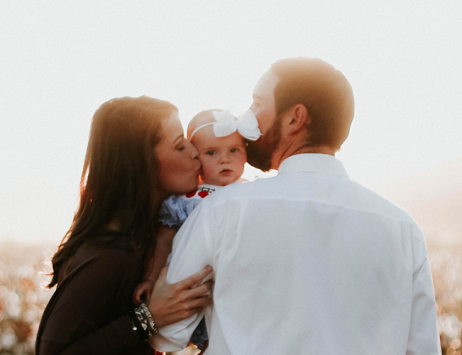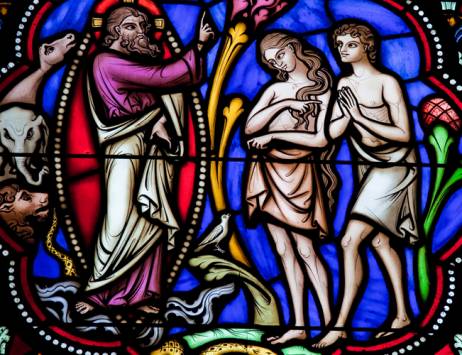“The book of the genealogy of Jesus Christ, the Son of David, the Son of Abraham: Abraham begot Isaac, Isaac begot Jacob, and Jacob begot Judah and his brothers. Judah begot Perez and Zerah by Tamar, . . . Salmon begot Boaz by Rahab, Boaz begot Obed by Ruth, Obed begot Jesse, and Jesse begot David the king. David the king begot Solomon by her who had been the wife of Uriah. . . . And Jacob begot Joseph the husband of Mary, of whom was born Jesus who is called Christ” (Matt. 1:1-6; 16).
As the gospels introduce us to Jesus, the first chapter of Matthew hints at something radical and unexpected simply by naming Jesus’s mother and grandmothers. Matthew doesn’t include all the women in Jesus’s lineage, but the ones he does include are united in an intriguing way, as each has a story that particularly spotlights the grace of God.
Matthew notes five women: Tamar, Rahab, Ruth, Bathsheba, and Mary. The fact that every man in Jesus’s lineage is mentioned but only five of the women are mentioned inevitably draws attention to these women. The men were mentioned to prove the fact of Jesus’s legitimacy to the throne through firstborn sons, but the women were mentioned to communicate something else. Look at the common elements in their stories to understand what God teaches us through them.
Jesus Came From Sinners
The first three of these women were notable sinners in their time and culture.
Tamar pretended to be a prostitute and immorally seduced her father-in-law after he denied her a son (Gen. 38).
Rahab really was a prostitute and known for her sin for which the Law said she should be stoned (Josh. 1-2). At first, Rahab seemed completely alienated from God. Yet, when faced with a choice, she aided and protected the Israelite spies who in return protected her family when the Israelites defeated Jericho. She eventually married one of those spies and gave birth to Boaz, King David’s great-grandfather. She served God’s larger purposes in her life, purposes that ultimately found their fulfillment well past her death when the Messiah was born of her descendants.
Jesus Was Descended from Outsiders
Ruth was a foreigner outside of the nation of Israel (Ruth 1-4). We might today see Ruth as virtuous, and indeed she was called that very thing by Boaz. But in the Jewish culture of her day, she was a foreigner alienated from the purposes of God, descended from Lot’s incestuous relationship with his daughter.
Bathsheba was targeted and shamed by King David, who cruelly exacerbated the situation with the murder of Bathsheba’s husband, Uriah (2 Sam. 11).
The Mother of Jesus
And then, there is Mary. Despite her excellent reputation, Joseph thought she had been immoral when she became pregnant (Matt. 1:19), a whispering that stayed with her through both her and Jesus’s lives.
Each of their stories gives us a sweet early taste of God’s grace through Christ and sets us up to recognize it when we encounter it in the stories of Jesus later in the gospels.
While Matthew marches through names of the men in this list of Christ’s ancestors, each name of a woman yells, “Grace!” Some earned the shame they endured, while some did not. But either way, they remind us of the first woman in Scripture, shamed by sin.
The First Mother
Eve listened to Satan’s lies, and it resulted in the sin nature all of us, male and female, now carry. When God entered the Garden after the Fall and first questioned Adam and Eve, Adam jumped in to blame Eve. Satan had targeted her. Adam blamed her. The weight of it all seemed to fall on her shoulders. But God turned toward Satan, not Eve, with condemnation in Genesis 3. It was Satan that He cursed. And even as He cursed him, He announced Eve’s role not in the Fall but in the redemption of mankind. One was coming who would destroy Satan, God said in Genesis 3:15, and He would be born of the woman.
Women have struggled with shame consistently since Eve ate that fruit in the Garden. Matthew’s genealogy works as a kind of herald, not just of Christ’s rightful place as Messiah but also of the women God used to bear Him into the world as Genesis 3:15 foretold.
The Grace of God
This second Adam, the Messiah, would not blame the woman as the first Adam did. And He would deliberately reach out to women bearing the shame of the Fall. Sick women. Immoral women. Barren women. Widowed women. Whether their shame was legitimate or not, they were all weighed down by it. Jesus lifted the shame from their shoulders and took it upon Himself. “For He made Him who knew no sin to be sin for us, that we might become the righteousness of God in Him” (2 Cor. 5:21).
The grandmothers of Jesus herald the grace of God that took our shame head on and replaced it with Christ’s righteousness. There is no condemnation and there is no shame for those of us in Christ Jesus, to the praise of His glorious grace.






